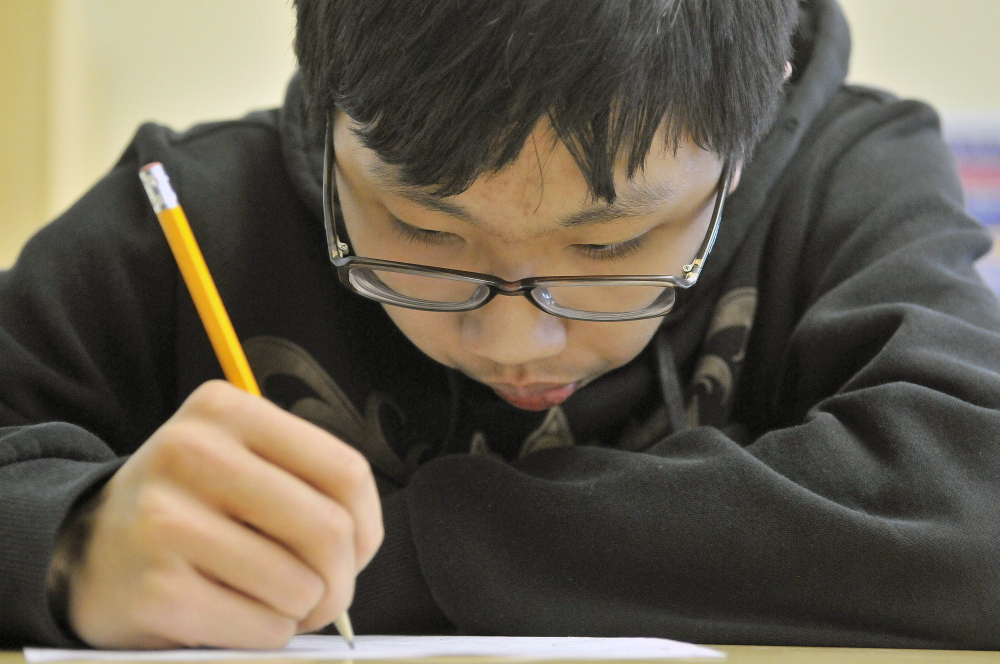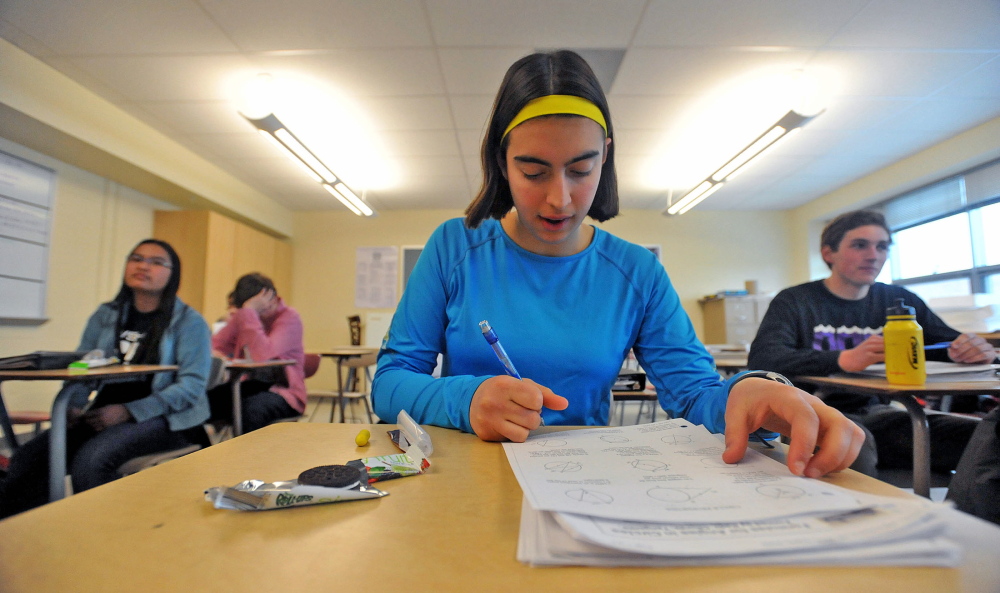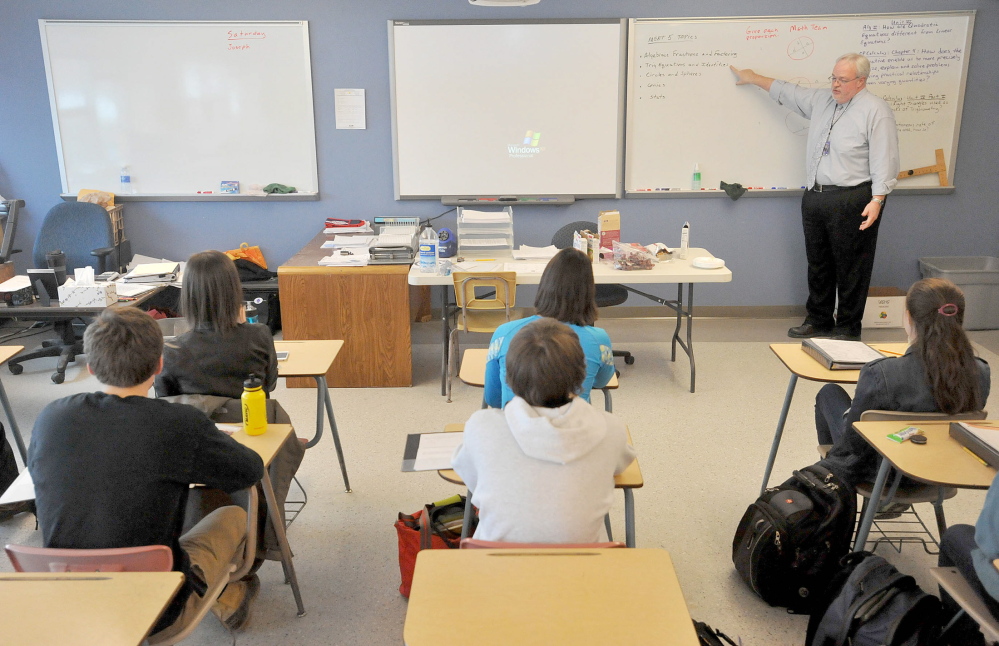WATERVILLE — After school on Thursday, a group of high school students were working on their game plan for their upcoming competition. The students were practicing meticulously while the coach was working on strategy and figuring out his best starting lineup.
This wasn’t the baseball team getting ready to start its campaign, or the football team prepping for next year’s season.
It was the Waterville Math Team.
Since the mathematics team — and it’s a team, not a club — was created in the fall of 2012, it has grown from six students to 16. The team has climbed steadily in the central Maine standings to second place out of 24 teams, behind only Erskine Academy. It is now 15th out of 143 teams in the state.
The growth of the Waterville team mirrors that of the Maine Association of Math Leagues, which began in 1969 with 10 schools and has grown gradually to the size it is today, according to Brian Twitchell, secretary of MAML and the central Maine division representative.
With the team’s final meet scheduled for March 12 at Cony High School before the statewide meet on April 8, the group has been meeting several days a week after school, practicing and designing strategy with its coach, mathematics teacher Scott Rivard.
THE FORMAT
There are six leagues encompassing MAML and five competitive meets through the school year, culminating in a sixth, statewide meet in April.
The meets take place at schools around the state, as gymnasiums get transformed into giant classrooms with tables, pencils, paper and calculators — only when allowed.
Each meet consists of five individual rounds and one group round of questioning. Each individual round has a math topic, including arithmetic, algebra, geometry and per-calculus, and three questions worth three, four and five points, increasing in difficulty. Each round lasts12 minutes.
“Basically, you have a minute per point,” Rivard said. “Sometimes you’ll get a three-pointer that should only take you 20 seconds.”
The categories for each meet are known beforehand, so the competitors can practice with repetition and figuring out different ways to solve the problems.
“In class, we’re taught mainly one method on how to do something; but in the math league, you need to know many methods, because you’re not sure how the problem will look,” said Maxwell Burger-Roy, a sophomore on the team.
While the Waterville team has 16 students competing, meets call for a group of 10 students to be selected as the competitors for the meet. The remaining students can still travel and participate, but their scores won’t be included in the tally.
From the 10 “mathletes” — yes, the term is embraced — the top six scores are compiled for the team score.
“I have a good idea going into a meet who the 10 students will be,” Rivard said. “Usually there will be six definite selections, and the rest of the spots the students will be competing for. For those spots, I take into consideration how much help they’re getting and how well they do on our practice meet before hand.”
BRAINS INSTEAD OF BODIES
Most mathletes will tell you that other than a love of mathematics, of course, the main reason for joining the team is for the competition.
“What math league allows us to do is we can really use our brains instead of our bodies to compete, which is sort of a different game in itself,” said Emmett Demaynadier, a junior in his second year on the math team. “It’s annoying, especially for someone like me who enjoys the competition, to go to a meet and not be competing. At the last meet, I heard I didn’t make the team of 10 by one point.”
Demaynadier, a 16-year-old swimmer for Waterville High School, certainly didn’t need another extracurricular activity to round out a college resume, as he is a part of the Science Olympiad team, the outing club and the “green” team. But when Rivard recruited him to join this new math team, it was another opportunity Demaynadier couldn’t pass up.
“When Mr. Rivard talked about having a team of kids that were going to do math, almost as a sport, it sounded like a lot of fun,” he said. “I don’t have much free time, and that’s how I like it. I’ve found if I have time to myself, I don’t spend it that great.”
Demaynadier isn’t an anomaly on the team, however, as nearly every member is active in athletics, drama or band, and every student on the team also already has taken or is taking advanced placement calculus. Recruited by Rivard at the beginning of the 2012 school year to join the team, Demaynadier was the type of student both Rivard and mathematics teacher Ted Brown, who also helps coach the team, wanted: overachieving, competitive and active.
“We talked to the kind of kids that when a teacher asks them to do something, they strongly want to do it,” Brown said, adding that the recruiting has subsided a bit in the second year as the team has gained popularity. “I won’t say it’s self-sustaining, but I think it could be for a little while.”
At the team’s first meet, in 2012, it only had six mathletes, placing fourth in the event, scoring 144 points. At its last meet, it took 16 students and finished with 288 points, second in central Maine to Erskine Academy in South China.
The competitors who have been there since the start have watched the team grow from just the six of them to the full squad it has now. Over that time, goals for the team and mathletes have evolved from staying competitive to wanting to win. But there’s a goal the team shares for one individual that helps with the camaraderie of the group.
“Our team goal is to beat Erskine,” Demaynadier said, “but we want Ursula to finish No. 1 in central Maine.”
THE SUPERSTAR
A 17-year-old senior at Waterville, Ursula Hebert-Johnson was the inspiration behind the mathematics team and the driving force to get it started.
At the end of her sophomore year in 2012, Ursula asked Rivard and Brown whether they’d be interested in starting a math team at the school. Both teachers had previous experience with math teams in their previous jobs but thought it would be difficult to find time for the commitment needed and money for dues and transportation.
“Neither one of us saw how we could find the time, not to mention money for dues and transportation,” Brown said. “As easy as it would have been to shut the door, Mr. Rivard and I couldn’t keep from talking about the potential of a Waterville High School math team led by Ursula.”
Hebert-Johnson’s mother, Michele Hebert, offered to pay for league dues to get the team started, and the first year was underway.
“We had a team, but it was small,” she said. “I never expected we’d be second place in the region already.”
Hebert-Johnson, who plans to attend Stanford University next year, couldn’t believe how quickly the team grew in slightly more than a year.
“I thought it would be a team of six throughout that whole first year,” she said. “It’s even better than I expected. So many people are joining, and it’s fun going to the meets and having the competition.”
Ursula now is first in the central Maine league with 202 points through four meets, and is tied for 17th in the state, 28 points behind the leaders, Sophia Dai of Cheverus High School and Benjamin Murphy from Oxford Hills High School.
THE RECRUITING GURU
For most of the students, it was persistent recruiting by Rivard that initially had them join, but it’s the effort he’s exuded that keep them there.
“He really encouraged people in his class and found a big enough group for us to start,” Hebert-Johnson said.
The rest of the students echoed that sentiment, saying without Rivard’s enthusiasm and commitment, the group would have gone nowhere.
“I have to give Mr. Rivard most of the credit, he puts his heart and soul into this team,” Emmett said. “After every math meet, there’s a presentation in each classroom about how we did and why you should join.”
Rivard has encouraged students to join any way he can, even by making it so students can participate on the math team for an independent study in lieu of taking a normal mathematics class.
And for a mathematics enthusiast such as Rivard, who has been teaching for 28 years and the last nine at Waterville, coaching a team he wasn’t sure he’d have the time nor the energy to commit too has revitalized his ardor for teaching.
“At the end of the day, when I’m ready to go home, it gives me so much more energy seeing the passion and love they have for math that I share,” Rivard said. “Now, I make the time to be here.”
And even after teaching mathematics for nearly 30 years, Rivard hasn’t stopped learning.
“Some of them think of things I don’t and solve problems in ways I wouldn’t think of,” Rivard said. “Sometimes I learn from them.”
Jesse Scardina — 861-9239jscardina@centralmaine.comTwitter: @jessescardina
Send questions/comments to the editors.





Comments are no longer available on this story